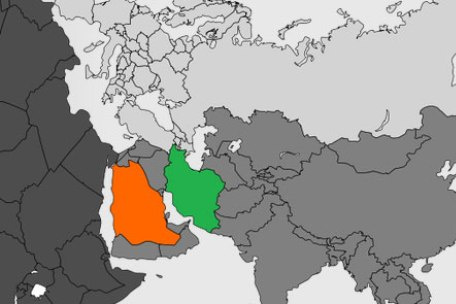The Arab Spring and New Tensions in Iran-Saudi Relations

By: Mohammad Reza Kiani*
Iran’s relations with Saudi Arabia have historically gone through many ups and downs. Before the Islamic Revolution, Iran and Saudi Arabia competed for primacy in the Persian Gulf, although as monarchies they found common ground both in opposition to Soviet penetration and also to the radical successor regimes that overthrew monarchies in Egypt and Iraq. However, the fall of Iran's shah after the Islamic Revolution in 1979 redefined Iranian-Saudi rivalry. The Iran-Iraq War increased Saudi concern about their security, leading to their financial support to Iraq, although the relations between Iraq and Saudi Arabia at that time were not warm. Since then, many efforts have been made to improve their relations, but there are still concerns for both sides.
After the 9/11 attacks, the rivalry has continued. And, as a matter of fact, everything that has happened since 2003 has led to the further empowerment of the Islamic Republic. The removal of the Taliban from power in 2001 and the permanent demise of a pre-invasion Iraq provide the Islamic Republic with new opportunities. Iraq can no longer offer a balance to Iran influence in the Persian Gulf, and Hezbollah’s triumph over Israel in the July war of 2006 gave it a resonant voice beyond its military capabilities and beyond its territories. Consequently, Iran as a regional power with a majority Shia population remains at the heart of such fears in Saudi Arabia, a predominantly Sunni state ruled by the al-Saud family since its foundation in 1932. Since then, Saudi Arabia-- with its Arab friends-- stepped up implementing policies to further corner Iran.
For instance, serious moves such as the Saudi-inspired invitation to Morocco and Jordan, both monarchies, to join the Persian Gulf Cooperation Council (PGCC), a group of autocratic states, are seen by analysts as part of Riyadh's effort to bolster defenses against Iran’s bid for regional hegemony.
Recent developments in the Middle East and North Africa (MENA) which provoked great resentment between Tehran and Riyadh, as well as the new US allegation of Iran's engagement in a plot to assassinate the Saudi envoy to Washington, can fan the flame of distrust and anxiety already existing between the two sides. Perpetually in fear of chaos and instability, Saudi Arabia is a leading force in the counterrevolution against the Arab Spring. Riyadh has played a leading role in the moves to stifle the popular uprisings sweeping the Arab world, not just in Bahrain, but also in Yemen, Egypt and elsewhere. As a self-identified bulwark of stability and conservatism, Riyadh wants to preserve the status quo or balance of power in the Middle East. Saudi officials are threatened by the potential emergence of representative forms of government in the region.
In one interpretation, Riyadh has been faced with a delicate dilemma in the wake of momentous developments in the region in favor of Iran. This policy has been strikingly evident in its dealings with Bahrain. The Saudi king decided to back King Hamad bin Isa al-Khalifa’s crackdown in Bahrain. Riyadh sent troops under the auspices of the Persian Gulf Cooperation Council to help crush pro-democracy demonstrations because most of the protesters were Shiites challenging a Sunni king.
Saudi Arabia’s supporters acknowledge that this confrontation can escalate, but the irony is that they tend to place the responsibility on Iran. Whatever their reason for believing the worst about Iran, the reality is that by blaming Tehran they are abdicating responsibility for themselves and Bahraini elites. The fact is that Riyadh sees the possibility of Bahrain's Shiite majority population taking power as a threat that could lead to Iranian dominance; a prospect that is wholly intolerable for Saudi Arabia.
In a similar vein but rather different terms, Saudi Arabia takes interventionary measures on Syria developments. Keen to contain its entrenched Shiite rival, Iran, Riyadh wishes-- in tune with its regional allies-- to see Assad off. Because his departure could shake up the structure of powers in the Middle East and weaken Iran’s influence to the advantage of other regional powers. In addition to wielding greater influence with Sunni communities in the region, the policy has another significant advantage for the Saudi establishment and may enable it to offset the public-diplomacy fallout from its repressive policies within Saudi Arabia and in Bahrain and project itself as a pro-democracy force in the region, as it has been striving to do since the outbreak of turmoil in Syria. This very irony represents a fault zone where Riyadh fears to tread. Riyadh’s pleas for reform and democracy are in marked contrast to the type of governance the Saudi family has practiced during it decades-long rule.
Following those flurry of interventions, Saudi diplomacy has largely gone quiet on Yemen. Analysts and diplomats say there are disputes within the ranks of senior princes and officials on whether to take a back seat, intervene more forcefully to stop democratic changes or, in some cases, to back them. Saudi Arabia has long pursued a divide and rule policy, supporting one faction against another―with money and arms―to keep Sana’a weak and beholden to Riyadh. With the escalation of pro-democracy developments in Yemen, in order to avoid the victory of pro-Iranian forces in Yemen, Riyadh threw its weight behind a (Persian) Gulf Co-operation Council initiative to ease the veteran leader out of office.
In such an environment, the US assassination plot allegation sparks new tensions in Tehran-Riyadh relations. To date, however, there is no clear evidence revealed by the US government regarding Islamic Republic aims and objectives and, analysts have questioned whether Tehran would actually take the incendiary step of killing a senior diplomat. Considering the competing interests of both sides in the region, one might be right to assume that continuing hostile policies and the continuation of the current situation may lead to further divergence between Tehran-Riyadh on the one hand, and can increasingly complicate the existing political-security challenges in the region on the other.

